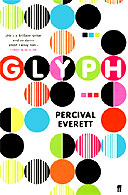
Glyph
by Percival Everett
208pp, Faber, £6.99
Babies are scary. Who knows what they are thinking, behind those fat cheeks and bright eyes? Giant malevolent babies are an effective device in certain horror films. But what about a hyper-intelligent, linguistically competent baby, who has opinions on Derrida and, without ever speaking, forms adult judgments on the actions of the grown-ups around him? That is the idea behind Glyph.
By the age of 10 months, its narrator, baby Ralph, is already able to understand everything that is said in his vicinity, to read books of philosophy, science and mathematics, and, though he chooses not to speak, to communicate by writing notes. His parents take the revelation in different ways. His mother, Eve, a painter, is delighted. His father, an academic whose papers are constantly rejected by journals and whom Ralph refers to only as "Inflato", feels threatened. There is no love lost between the two men in the family, anyway. Ralph introduces his parents with the line "My father was a poststructuralist and my mother hated his guts", and there is no doubt on which side the baby's sympathies lie.
Glyph is partly a mischievous and very funny satire on poststructuralist thought and literary "theory", with whose acolytes one imagines Everett, professor of English at an American university, must have had much displeasurable contact. Of his hack father, Ralph writes pitilessly: "Inflato was being so conspicuously seduced, or fooled, by the language he had chosen, though claiming a simple awareness of discourse ... Ideas were only marginally of interest, his primary need being community."
French cultural theorist Roland Barthes is a character in the novel, fantastically self-absorbed and irritating, and sexually predatory. Once he is invited to dinner with Ralph's parents, and the baby describes the guest's agenda perfectly: "Barthes was looking at my mother with his French accent." Elsewhere, Ralph is being trained to use a lavatory, and finds it useful to consider psychoanalysis: "And so the exercise of considering Lacan facilitated my defecatory mission." Throughout the novel, Ralph considers and rejects the propositions of numerous writers with violent joy. One of the few canonical philosophers for whom he exhibits some affection is Wittgenstein.
The text is further festooned with sub-headings such as "différance", "pharmakon", "libidinal economy" and "ens realissimum", as well as footnotes, poems about structures in the human body, semiotic diagrams, and equations. It is an enjoyable riot of material, along the lines of a postmodern Tristram Shandy.
Action is soon introduced when Ralph is abducted by a mad psychologist, after a battery of tests has revealed him to have an IQ of 475. Before the psychologist can have her wicked way with him, he is abducted from his abductors, and falls into the clutches of a secret US government agency, under whose command, as "Defense Stealth Operative 1369", he will practise espionage in such facilities as the "Dionysus Missile Works".
The dramatic tension of a hero who is super-intelligent but, as with all babies except giant malevolent ones, utterly physically vulnerable, could have fuelled highly inventive scenarios, but in fact is only hinted at a few times, and, somewhat disappointingly, Ralph tends to escape dangerous situations simply by scurrying out of sight. Indeed the novel bespeaks a kind of condescending disdain for the thriller-style plot that it sets up. The government-issue baddie, Col-onel Billy Joe Bob Roy, is introduced as "commanding officer of the Division of Exploitation of Potentially and Reportedly Trainable Mentally Exceptional Neophytic Tikes, DEPARTMENT Department of the Pentagon", and this kind of sub-Pynchon-esque conspiriological humour, combined with tales of the colonel's participation in presidential orgies and his friendship with Ferdinand Marcos (who is both the owner of a diner and the real Ferdinand Marcos), pushes the novel into broad parody.
Suddenly the satire appears to have too many targets, and is reduced to scattershot blasts rather than pinpoint sniping. One is presumably meant to wonder who is narrating the third-person scenes involving the colonel when Ralph is not present: whether they are imagined by Ralph and influenced by his readings in the trashy thriller genre, and if so, whether they can be said really to have occurred within the story - and further, whether such a question itself makes any sense. For Ralph is not just the narrator of his adventures but a highly self-conscious and self-described novelist, who offers up his own "Theory of Fictive Space", something like a Tractatus Logico-Philosophicus for novels, which contains an arcanely organised list of gnomic utterances about fiction, such as "B._A) Story is not fiction, but a state of affairs that occupies fictive space, the logic therein being its own logic and true only to itself."
Whether readers find such a rich stew of metafictional apparatus rebarbative or enjoyable is largely a matter of taste, but one certainly leaves with the impression that Everett does not intend it all to be laughed off. Throughout Glyph, there are imagined dialogues between writers and philosophers, as between Socrates and James Baldwin, that combine knockabout comedy with serious reflection, and peeking out through certain lines of this highly entertaining pseudo-novel are fragments of something that could be rearranged into a provocative theory of art and language. But in the end it is Ralph's book, and it is his voice - the voice of an impossible character; sarcastic, gleeful, irrepressibly energetic - that makes Glyph such an enjoyable read.

